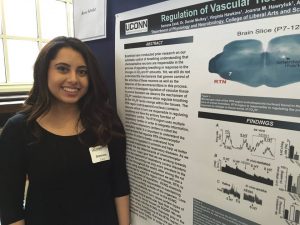 Loading...
Loading...
RSVP to attend:
Perceived Discrimination Affecting Muslim Health
2016-2017
Investigators: Sara Hasan, Michelle Morris
Faculty Advisor: Rick Gibbons
In the past decade, Muslim discrimination has increased to an all-time high. Multiple research journals have identified that discrimination can have adverse health effects on people of certain races. While studies have predominantly been researched towards African-Americans and Hispanics, I questioned how discrimination affects Muslims around the United States. My project aimed to understand the effects discrimination against Muslims has on their overall mental and physical health. Using an online survey website, the first study took place approximately one week after the 2016 United States Presidential election to see if there were adverse health effects present in Muslims, due to the election results. With the same participants for the second study, four months after the election, we will be maintaining contact to see if more health issues, if any, have arisen or if the previous ones have continued on since then. Along with the Muslim participants, we included a significant subsample of non-Muslims to compare their health behaviors during both waves of the study. This project analyzes the issues of Muslim discrimination and how it affects the health of Muslims in the United States.

Regulation of Animal Vascular Tissue in a Brainstem Respiratory Center
Spring 2015-Fall 2016
Investigators: Dr. Daniel Mulkey (Associate Professor), Virginia Hawkins (Post doc fellow), and Samana Zaidi
I have worked in Dr. Daniel Mulkey’s lab investigating the processes involving regulation of animal vascular tissue in the brainstem respiratory center. We have been using mammalian models to conduct our research, therefore, rats and mice were utilized. Our research has been focused on chemoreception which is the mechanism by which breathing is regulated as levels of CO2 and H+ increase or decrease in tissues. An important region of interest of ours is the retrotrapezoid nucleus known as the RTN. Within the RTN there are neurons that control breathing. An important channel is contained within the RTN region known as the KCNQ channel. We focused on multiple KCNQ channels primarily KCNQ2 and KCNQ3. These channels are potassium channels that are critical for brain function. We investigated the effects of loss of function and gain of function on KCNQ channel variants and what the response leads to be. In addition, the research was further applied to how we can use KCNQ2 channels to target patients with encephalopathy.
Understanding the Role of SR-B1 in Lipid Metabolism and Inflammation
Summer 2016
Investigators: Christopher Blesso, Christina Jiang
SR-B1 is an HDL receptor that has a role in cholesterol exchange and the initiation of intracellular signaling cascades involved in lipid metabolism. SR-B1 is highly expressed in the liver, but its function has not been fully determined in adipocytes, which is the aim of this project. Cholesterol imbalance can result in disease states such as atherosclerosis, so the study of this HDL receptor can be implicated in disease prevention.
The aim of the research was to perform successful knockdown in 3T3-L1 adipocytes by using siRNA (scramble, cyclophilin, SR-B1); determine gene expression of SR-B1 and cyclophilin to confirm knockdown; determine inflammatory response of adipose by introducing LPS or macrophage-conditioned media to cells. After treating the cells with the appropriate reagents, RNA was isolated, cDNA was synthesized, and PCR was conducted to confirm knockdown. There was a 40% knockdown in cyclophilin when treated with cyclophilin siRNA and insignificant knockdown with SR-B1 knockdown. There is about a 60-70% knockdown of SR-B1 in adipocytes treated with SR-B1 siRNA, indicating that the knockdown was successful. In the presence of macrophages, there is about a 40% knockdown of SR-B1. In the presence of LPS, there is also about a 40% knockdown of SR-B1. These successful gene knockdowns provide evidence to continue on with the experiment.
Click the link below to see our Honors Scholarship Recipients!
Be sure to stop by the Honors Programming & Events Office every Wednesday for our “We’re Here for You Wednesdays” Series.
Honors and Enrichment staff members are here for you! While staff members are available for appointments, we recognize that sometimes you just have a quick question that won’t take a whole appointment or you would just like to touch base to update us on progress or to discuss goals. “We’re Here for You Wednesdays” are a chance to seek advising or support on a walk-in basis from:
2:30-4:30pm on Wednesday afternoons in the Buckley Honors Programming and Events office
Each week will feature different members of the Honors and Enrichment team focusing on different topics. Learn more.
Hello Honors Community!
We hope that you enjoyed your breaks and are looking forward to the new semester! We have exciting updates regarding the Honors Events Calendar:
All the Best,
Honors Programming and Events Team